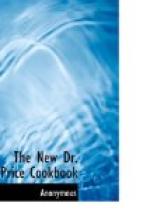Invert all jars after filling and sealing.
Fruit should be sound, firm and not overripe and carefully prepared.
Clean fruit, clean hands, clean utensils, and a clean kitchen free from flies, are essential for safety and success.
Keep products in a cool place. Avoid freezing in winter.
CANNING
Canning is the process of preparing sterilized food so that it will keep indefinitely.
The custom of canning fruit in syrup is based on the improvement in flavor and texture which sugar gives to fruit. Sugar is not necessary for its preservation. Success depends upon thorough sterilization—that is, killing the organisms which cause food to spoil, and then sealing perfectly to prevent their entrance. Fruit may be canned in water, in fruit juice and in syrup.
PRESERVING
The only difference between preserving and canning fruit is that sugar is always used in preserving, while in canning it is used in smaller quantity or not at all. In preserving the old rule of equal weights of sugar and fruit may be followed.
OPEN-KETTLE METHOD
This method is generally used for preserves, jams, and marmalades. Food is completely cooked and then poured boiling hot into sterilized jars.
Prepare fruit, which may or may not be peeled, and cut into pieces depending on the variety. Blanch or scald peaches and similar fruits to loosen skin and chill by plunging into cold water. Cook slowly in as little water as possible or in fruit juice or fruit syrup until done. Fill sterilized jars, seal and invert.
CAN-COOKED METHOD
By this method uncooked or partly cooked food is packed in can or jar, covered with liquid and both jar and contents sterilized.
Pare fruit if desired or blanch or scald in boiling water a small quantity of fruit at a time. (See time table.) Do not blanch cherries, sour cherries excepted, berries or plums.
Chill outside of blanched fruit by immersing a few minutes in a large vessel of cold water. Remove skin from such fruits as peaches.
Pack fruit firmly in clean, tested jars to within one-half inch of top.
Fill jars to within 1/4 inch of top with boiling water, fruit juice or syrup.
Place new rubber on each jar, adjust cover and partly seal.
Place jars on false bottom of water bath and sterilize for required time. See time-table. If the hot-water bath is used, jars should be immersed in sufficient boiling water to cover tops to depth of about 1 inch. Do not begin to time the sterilizing until water boils. Keep water boiling during sterilizing period.
Remove jars from sterilizer. Seal them and invert to cool. Avoid draft on jars, but cool as rapidly as possible.




